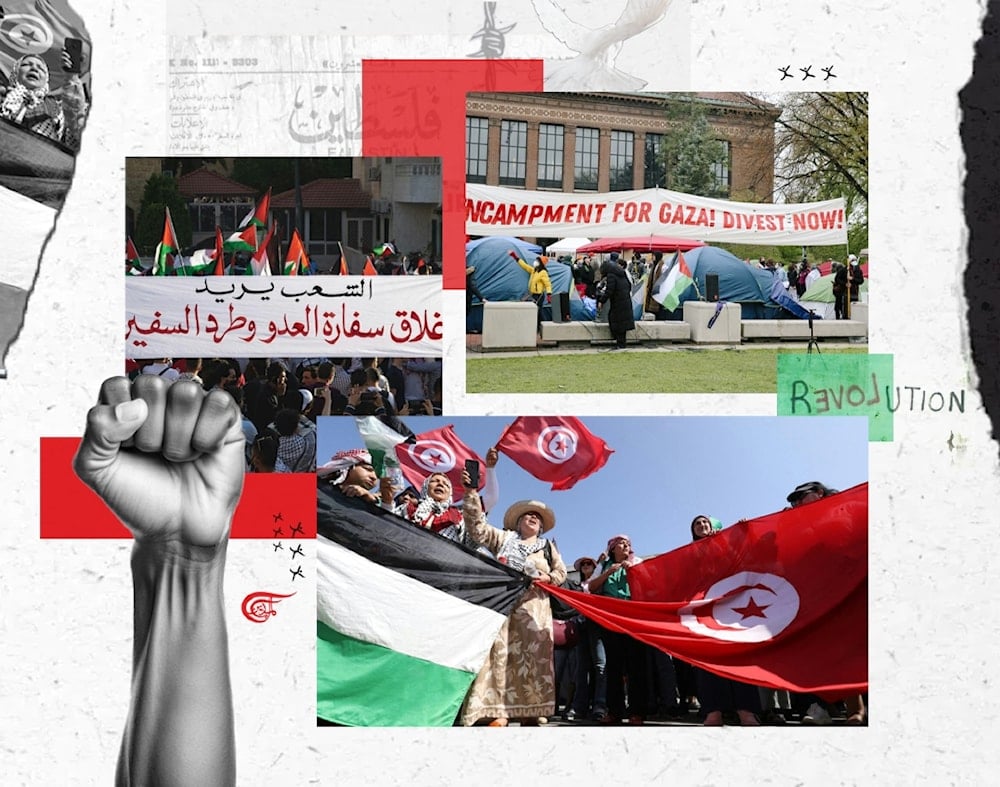The Reawakening of the Arab Left: Amman to Tunis, new voices challenging empire and capital
Hamzah Rifaat explores the post-2023 resurgence of the Arab left from Amman to Tunis, where youth-driven movements are challenging empire, Zionism, and capitalism through cultural resistance and grassroots activism.
-

Beyond the United States are critical leftist perspectives which underline the reawakening of the Arab left. (Al Mayadeen English; Illustrated by Zeinab el-Hajj)
History gives evidence of American foreign policy in the MENA or Middle East and North Africa region being an abject failure. The ‘Empire’ with its failed regime change operations in Iraq and Libya, clientele politics, crony capitalist deals serving the military-industrial complexes of Western economies, and the tiny elite in Arab countries, has only disillusioned the Arab youth.
As MENA elites benefited from Western market economies, failing systemic transformations in the absence of egalitarianism and increased societal upheaval domestically have prompted the youth to undergo a reawakening of leftist proclivities.
This reawakening has gained renewed momentum due to the deeply entrenched Israeli occupation of Palestinian territories, the Zionist regime’s relentless genocide, rising destitution, and inequities in Arab countries in 2024-2025, all resulting in cultural and intellectual reclamations through youth movements and unions challenging the status quo.
A closer examination of trends in 2024-2025 also suggests that leftist activism anchored in ant-imperialism is gaining ground in the Arab world and among Arab activists abroad who are against neocolonialism and capitalism.
A Break from the Trend of the 80s
The 1980s in the Middle East was an era when neoliberal ideals and financial systems championed by the United States and its allies left an indelible impact on societies, cultures, and governments in the region. Arab elites benefiting from crony capitalism undermined Arab nationalists, leftists, and socialists vouching for the protection of their state from foreign intervention and violations of popular sovereignty. The United States under the Bretton Wood’s system however, initiated structural adjustments and tinkered with local economic systems in the name of ‘economic reforms’ which only undercut prospects for egalitarianism and promoted elite captures, rising income inequalities and privatization instead. The effects of 1980s are visible in many Arab states today including Jordan and Tunisia where destitution and inequities persist despite a small elite benefiting from constructive relations with countries such as the United States.
However, this trend changed in the post 9/11 era, where a deeply entrenched elite community enabled by so called ‘democratization’ from the United States faced backlash over monopolized systems and close circles of oligarchs, rendering the state, economy, and political systems subservient to the whims and wishes of a select few. This prompted a growing realization among Arab citizens and the youth to replace predatory systems detrimental to the polities of the common Arab man.
Post Genocide Revitalization
This realization and left wing push witnessed a revitalization as the Gaza genocide perpetrated by the Zionist regime in 2023, along with its cohorts, intensified in scale, scope, and intensity. "Israel’s" genocide is a quintessential example of neocolonialism, fascism, and crony capitalism in full flow, which is only benefiting the Israeli settlement enterprise and the American military-industrial complex. This, however, has been concomitant with a leftist Arab awakening across the globe. Think of the Palestinian Youth Movement (PYM), a transnational, socialist, and anti-imperialist organization with branches across North America. The PYM mainly consists of Arab and Palestinian youth and emerged as an active socialist movement in the United States in the genocide environment, which rejected the neoliberal party channels of the Democrats and Republicans which have stifled Palestinian nationhood and have instead taken part in the 2024 US campus protests at Columbia University.
They successfully translated the 2024 "Trinity of Fundamentals", a Palestinian resistance novel to promote anti-colonial, and anti-apartheid consciousness among the wider US population, and with such efforts, they tasted success when Danish multinational shipping company Maersk announced in June 2025 that it was cutting ties with the Israeli settlement enterprise.
Beyond the United States are critical leftist perspectives which underline the reawakening of the Arab left. This includes Rezgar Akrawi, a critical Arab leftist who has critiqued the capitalist monopoly of artificial intelligence software and platforms. It is important to note that "Israel’s" genocide in Gaza has also been marked by fake narratives, disinformation campaigns and misinformation being disseminated on social media platforms by Zionists through Facebook and Israeli companies. This includes content which whitewashes Zionist crimes against humanity and instead focuses on Hamas.
The efforts of the Arab left are hence, laudable and even more significant given that the Gaza genocide enabled the youth to use social media platforms to promote the Boycott Divestment and Sanctions movement to pressure "Israel" to comply with international law and end its occupation of Palestinian territories. Clearly, the standard modus operandi of protests has transformed for the Arab left, which now translates into broad cultural solidarity and digital resistance. The muzzling out of Palestinian voices has also been a characteristic of neoliberalism in the United States and its blind support for "Israel".
Leftist academics, however, have fought back. Think of Iranian intellectuals such as Asef Bayat at the University of Illinois Urbana-Champaign, who rebuffed the elitist status quo which marginalizes the low strata of society in the US while underlining the importance of street politics and disadvantaged urban groups adopting quiet encroachments as a legitimate form of resistance.
Beyond the US, there is a lot to look forward to. Palestinian political parties which came together in Beijing due to China’s diplomatic efforts: there is a renewed push for actual democratic revival in the occupied territories, with emphasis placed on women, students, and children’s empowerment. Also, the post-2011 youth in Tunisia is seeking to build community resilience, and grassroots level projects instead of relying on Western aid. Whereas in Jordan, the ‘Widha’ Party is becoming more vocal on labor unionism and Palestinian rights while opposing liberal elites. A lot of the present trends drawn from the works of Palestinian politician George Habash fused Marxism and Arab nationalism while vilifying Zionism as a capitalist instrument.
What is evident however, is that Western liberal elites have failed to provide material security to Arab states, and its moral and geopolitical decline in the form of silence on Gaza’s genocide indicates that alternate ideologies must take hold.
The reawakening of the Arab left in the genocide era, both regionally and globally, is a positive development in this regard.

 Hamzah Rifaat
Hamzah Rifaat
 6 Min Read
6 Min Read











